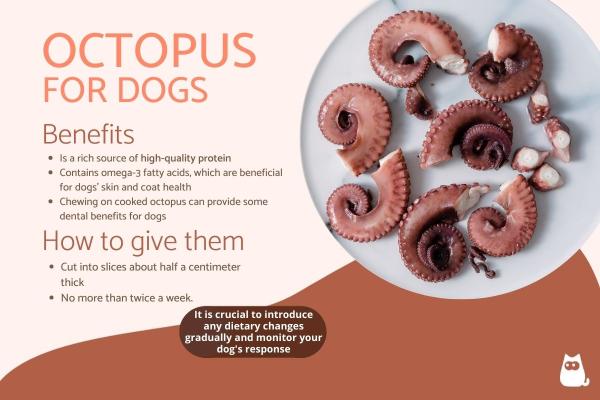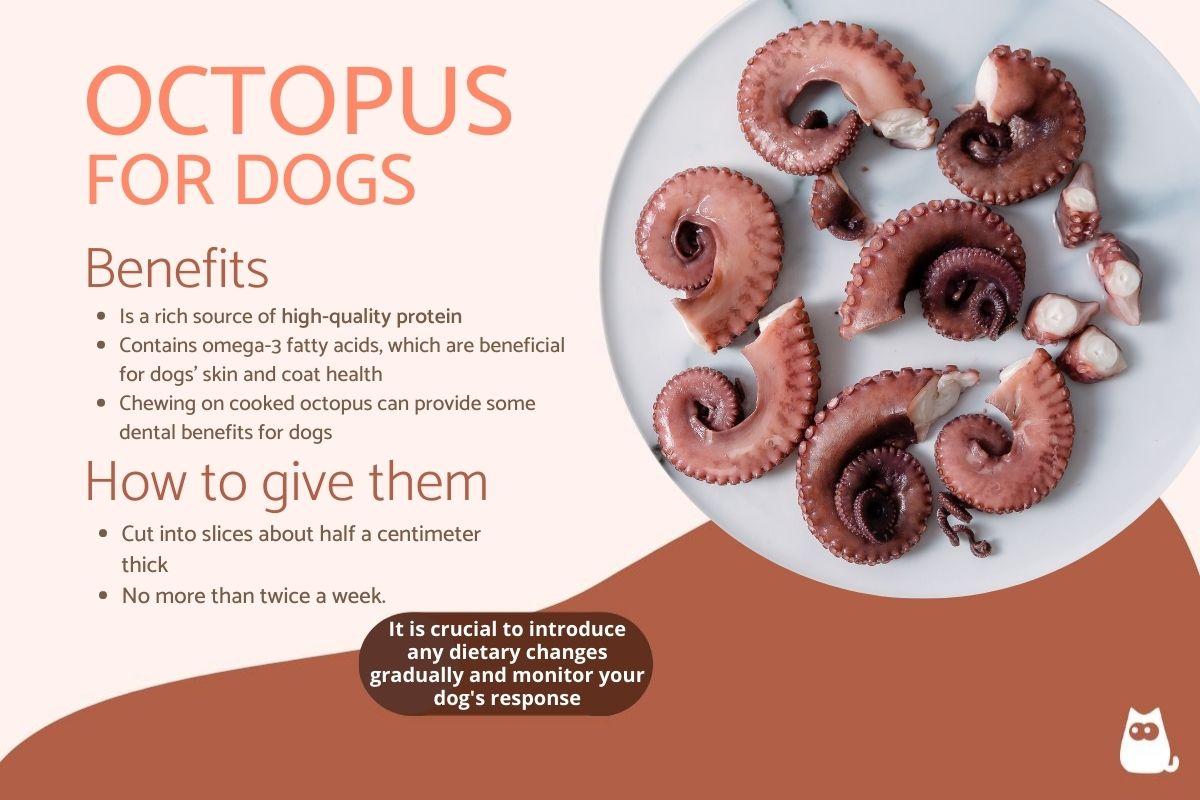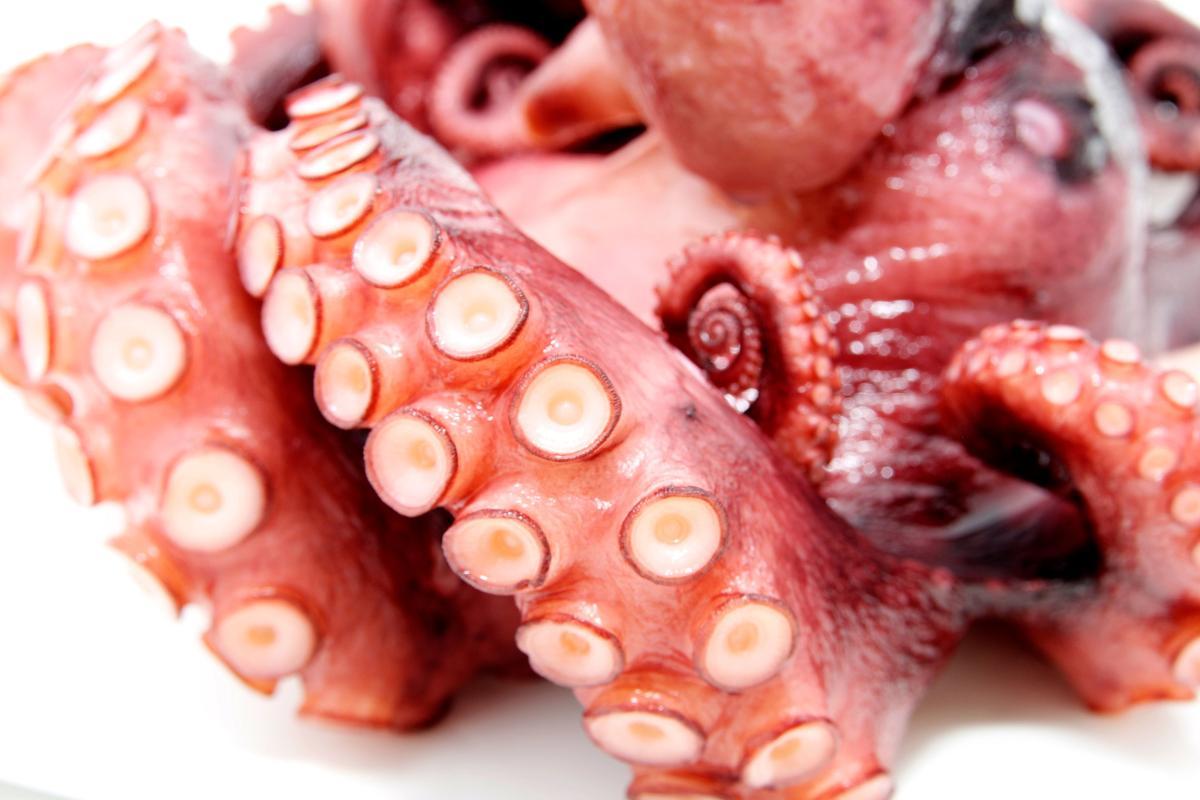Can Dogs Eat Octopus?



See files for Dogs
In our roles as responsible pet owners, we often have to consider whether certain foods are suitable for our beloved pets. We may consider feeding our dogs octopus due to its nutritional value. This intriguing marine creature has long been a staple in various cuisines, captivating not only food enthusiasts but also health-conscious individuals. We must recognize, however, that what is nourishing for us may not necessarily be nourishing for our pets.
This AnimalWised article explores the potential benefits, risks, and considerations of including octopus in the diet of our dogs.
Can dogs eat octopus?
Octopus is not commonly found in commercial dog food due to its high cost; however, it can be a highly beneficial and safe food option for dogs when cooked. Cooked octopus offers excellent nutritional value without any toxic elements that could harm your pet's health.
Feeding dogs raw octopus is not recommended as it may harbor pathogenic microorganisms, potentially causing foodborne illnesses. Despite the belief that freezing can destroy these microorganisms, many can survive the freezing process and multiply when the food is thawed. Thus, it's crucial to always offer octopus to dogs in a cooked form to ensure its nutritional contribution is safe.
Thoroughly cooking the octopus eliminates any harmful bacteria or pathogens, making it a safe and nutritious treat for your furry companion. Cooked octopus provides essential nutrients like protein, vitamins, and minerals, contributing positively to your pet's overall health.
Moreover, the cooking process not only enhances safety but also improves the flavor, making it more palatable for your dog.
As with introducing any new food, it's wise to monitor your dog's reaction and consult with a veterinarian if you have concerns or if your dog has specific dietary restrictions or health conditions. By doing so, you can ensure your dog enjoys this occasional treat while staying healthy and happy.
You may find this other article intriguing as it delves into the components of a well-balanced and healthy dog diet.
Benefits of octopus for dogs
Octopus can offer several benefits to dogs when included in their diet in appropriate portions and in a cooked form. Here are some of the potential benefits of octopus for dogs:
- High-quality protein: octopus is a rich source of high-quality protein, which is essential for muscle maintenance, repair, and overall growth in dogs. Protein supports their energy levels and contributes to healthy bodily functions.
- Omega-3 fatty acids: octopus contains omega-3 fatty acids, which are beneficial for dogs' skin and coat health. These fatty acids help reduce inflammation, maintain a healthy coat, and promote a shiny and lustrous coat.
- Essential vitamins and minerals: octopus contains various essential vitamins and minerals, including vitamin B12, iron, selenium, and phosphorus, which are vital for maintaining good health and supporting immune function in dogs.
- Low in fat: octopus is relatively low in fat, making it a suitable option for dogs that require a low-fat diet, such as those with certain health conditions like pancreatitis.
- Easily digestible: cooked octopus is easily digestible for most dogs, reducing the risk of gastrointestinal discomfort or issues.
- Novel protein source: if your dog has food allergies or sensitivities to common protein sources like chicken or beef, introducing octopus as a novel protein can be an alternative option to diversify their diet.
- Dental health: chewing on cooked octopus can provide some dental benefits for dogs, helping to clean their teeth and reduce tartar buildup.
Incorporating cooked octopus into a dog's diet can be an excellent way to enhance their nutritional intake, provided it is given in appropriate portions and as an occasional treat. However, as with any dietary change, it is advisable to consult with a veterinarian, especially if the dog has specific health conditions or dietary restrictions.
Don't miss this informative article if you're interested in learning about Omega-3 rich food options for dogs.
Octopus portion for dogs
While octopus can provide nutritional benefits, it should only be given in moderation and as an occasional treat, not as a regular part of their diet. Here are some guidelines to follow when feeding octopus to dogs:
The portion of octopus given to a dog should be proportionate to its size and weight. Larger dogs can tolerate slightly more, but it's essential to offer it in moderation even for them. Treat-sized portions of cooked octopus can be given to dogs as special rewards during training sessions or as delightful surprises.
The size of each treat can be as small as a bite or two, depending on the dog's size.
Remember that treats, including octopus, should only constitute a small portion of a dog's overall diet. The majority of their food should come from a nutritionally balanced and complete dog food that meets their specific dietary needs.
As a general guideline, it's recommended to offer octopus to your dog no more than once or twice a week.
Since every dog's dietary requirements and sensitivities vary, it's always best to consult with a veterinarian before introducing new foods like octopus into their diet. This way, you can ensure that the food choices align with your dog's unique needs and health considerations.
Discover more about the safety of giving squid to your dog in this other article
How to serve octopus to my dog?
As mentioned earlier in the article, it is crucial to offer octopus only in a cooked form. The simplest approach is to purchase pre-cooked and vacuum-packed octopus tentacles, readily available in supermarkets.
However, if you prefer cooking it at home, follow these steps for optimal results:
- For a tender texture, consider freezing the octopus before cooking it. Alternatively, you can buy it directly frozen.
- Thaw the octopus slowly by placing it in the refrigerator the day before cooking.
- Once thawed, wash the octopus thoroughly with cold water to remove any potential impurities.
- Heat water in a saucepan, and as it starts to boil, immerse the octopus in and out of the saucepan three times. Then, fully submerge the octopus in the boiling water and cook it for 25-30 minutes over medium heat.
- After cooking, allow the octopus to cool down before cutting it into slices about half a centimeter thick, ready to offer to your dog as a treat.
When preparing octopus for your dog, refrain from adding salt or any other ingredients such as paprika, garlic, or onion. Keep it plain to ensure the safety and suitability of the treat for your furry companion.
Curious about whether dogs can safely consume mussels? Find the answer in this other article.

Side effects of octopus for dogs
While octopus can offer nutritional benefits to dogs when cooked and given in moderation, there are some potential side effects and risks to be aware of:
- Octopus can have a chewy and rubbery texture, which may pose a choking hazard, especially if it's not cut into appropriate-sized pieces or if your dog swallows large chunks without proper chewing.
- Introducing new foods, including octopus, into a dog's diet can lead to gastrointestinal upset, such as vomiting, diarrhea, or gas, particularly if the dog is not used to this type of food.
- Some dogs may be allergic to seafood, including octopus. Allergic reactions can manifest as skin rashes, itching, hives, or even more severe symptoms like difficulty breathing. If you notice any signs of an allergic reaction, discontinue giving octopus immediately and seek veterinary attention.
- While the high protein content in octopus can be beneficial in moderation, excessive protein consumption may strain the dog's kidneys and liver, particularly in dogs with pre-existing kidney or liver issues.
- Octopus naturally contains sodium, and while it can be fine for dogs in small amounts, excessive sodium intake can lead to issues like dehydration and increased blood pressure. It's essential to avoid adding any additional salt or seasonings when preparing octopus for dogs.
- If the octopus is not cooked properly, it may harbor harmful bacteria like salmonella or other pathogens, leading to foodborne illnesses in dogs.
To minimize these risks, ensure that octopus is thoroughly cooked, plain, and free from any seasonings or additives before offering it to your dog. Always cut it into small, manageable pieces appropriate for your dog's size to reduce the risk of choking. Additionally, consider introducing octopus gradually into your dog's diet and monitor for any adverse reactions.
Contraindications of octopus for dogs
While octopus can be a suitable food for dogs, there are specific cases where its consumption may be contraindicated, such as:
- Dogs with food allergies or intolerances.
- Dogs with a highly sensitive digestive system that may not tolerate dietary changes well.
- Dogs with gastrointestinal pathologies.
In these situations, it's essential to avoid giving octopus to dogs to prevent any potential adverse reactions or discomfort. Always prioritize your dog's health and consult with a veterinarian if you have any concerns about their dietary choices.
Delve into the best diet for dogs with food intolerance in this other article.
If you want to read similar articles to Can Dogs Eat Octopus?, we recommend you visit our Homemade diets category.
- Ministry of Agriculture, Fisheries and Food (MAPA). Octopus. Octopus vulgaris . Available at: https://www.mapa.gob.es/es/ministerio/servicios/informacion/pulpo_tcm30-102914.pdf






